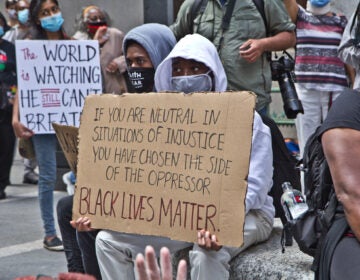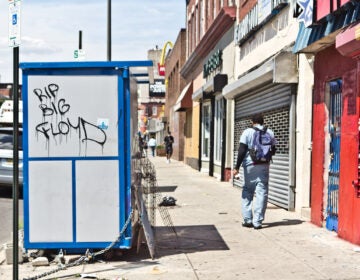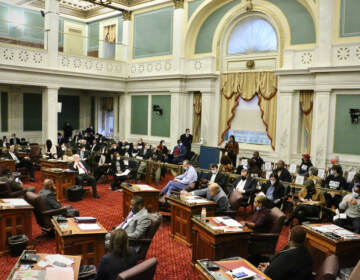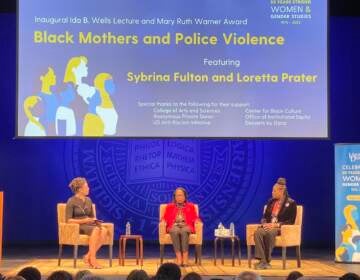Philly could be the first U.S. city to address systemic racism with Black stimulus
The package would include capital investments in poor neighborhoods, as well as millions more on job training, rent subsidies and basic income support.
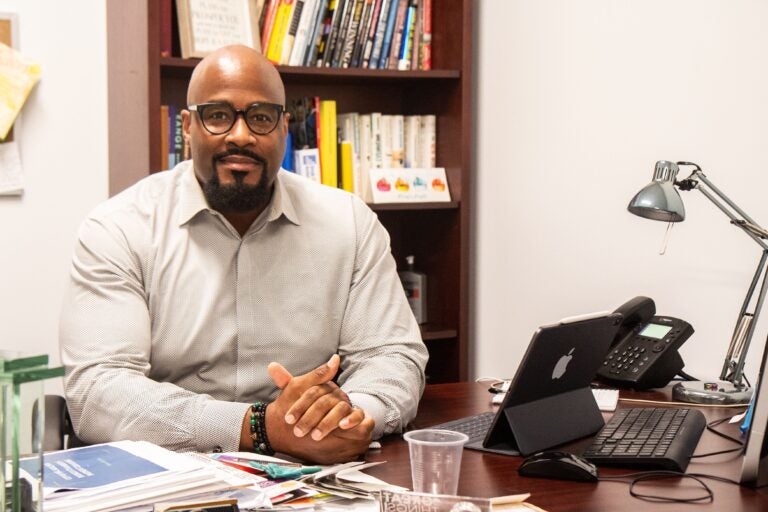
Donavan West is president and CEO of the African American Chamber of Commerce of Philadelphia. (Kimberly Paynter/WHYY)
Donavan West has some ideas for how the city can help Black communities and businesses starved by the pandemic, damaged by civil unrest and suffering from long-term underinvestment.
Workforce development is near the top of his list. Improve career education programs, close the digital divide, train young people in innovation and automation, and teach them about finance and entrepreneurship.
“That kind of overhaul is kind of a significant one, and it’s going to take a lot of money,” said West, a longtime entrepreneur and CEO of the Philadelphia-based African American Chamber of Commerce of Pennsylvania, New Jersey and Delaware.
West, who previously led a business coaching firm, said the city could also provide shorter-term help by funneling funds through Community Development Financial Institutions, which provide loans in low-income communities underserved by traditional banks. In hard-hit areas like 52nd Street in West Philadelphia, the city could take on more of a property manager role.
“The city provides a voucher to minority construction companies to do the job of fixing up these different corridors. That way the money goes to minority-owned companies that are going to hire minorities, increase employment and also support those businesses,” he said.
Programs like these could provide long-lasting boosts to business districts and neighborhoods that were already struggling before the crises of the past few months, he said.
Some councilmembers are thinking along those same lines. West applauded a council resolution calling for a “Black stimulus package” that would spend half a billion dollars on capital investments in poor neighborhoods, as well as millions more on job training, rent subsidies and basic income support. Council is expected to discuss the resolution at a hearing Thursday.
“Although there’s sticker shock from looking at it, if you actually do the math and think about where we are in terms of the poverty levels, we do need a significant investment,” West said.
The measure sponsored by Councilmember Maria Quiñones Sánchez calls for significant borrowing and spending amid a $749 million revenue shortfall caused by the coronavirus pandemic. But Quiñones Sánchez argues the council has a responsibility to pass a “moral budget” to support Black residents, whose economic struggles have drawn renewed attention during the recent protests over police brutality. In the bill, she cites “an unprecedented movement to reinvest Broken Windows policing [funding] into a Black stimulus that provides real economic security for our neighbors.”
“Why not make that substantial investment and say, ‘Let’s think big, let’s do several hundred million dollars,’” she said at a council committee hearing earlier this month.
After weeks of passionate public debate and protest over spending priorities, a revised municipal budget package that includes a $33 million cutback to the police department’s budget passed in a late-night Zoom meeting Wednesday. The revised spending plan will be discussed at City Council on Thursday, along with the Black Stimulus resolution. A budget for the next fiscal year must be approved by June 30.
Quiñones Sánchez notes the city’s Black residents are about twice as likely to live in poverty than whites, they are at higher risk of dying from gun violence or from COVID-19, and that they own only 2% of businesses despite representing 44% of the population.
“The city has an opportunity for a smart restart and to reimagine our city and our neighborhoods. African American, Latino and other racial minority groups should not be furthered disenfranchised in our recovery,” the bill says.
The disproportionate impact of the pandemic on African Americans has spurred calls for a new federal relief package that supports Black institutions and businesses and seeks to overcome the effects of past segregation and racist policies.
There are few close precedents for the type of city-backed stimulus that Quiñones Sánchez is proposing. One small example is in Portland, Oregon, a mostly white city with a small Black population. In 2015, the city created a fund to foster minority business growth and entrepreneurship with a goal of raising $3 million. Seattle has a small fund that gives technical assistance grants to coalitions that promote racial equity.
But the councilmember’s proposal does fit into a long history of efforts in Philadelphia and other cities to promote racial equity through budget and policy decisions, said James Crowder, a senior associate with PolicyLink, a California-based research and advocacy organization.
Crowder previously worked for the Local Initiatives Support Corporation in West Philadelphia, helping connect low-income neighborhoods with public and private funding sources for community improvement efforts. He said cities’ racial equity programs are most effective when they focus on helping those with the greatest need.
That’s in part because Black residents are already overrepresented among groups like the unemployed, those with low incomes and the homeless, he said.
“If you focus on the most marginalized, everybody benefits,” he said. “If we focus on identifying the reasons that low-income Black folks have not been able to access economic security or economic mobility and address those, everyone benefits.”
Philadelphia is already a model for other cities in its use of real estate tax relief programs, such as the Longtime Owner Occupants Program (LOOP), the Homestead Exemption and the Owner-Occupied Payment Agreement (OOPA) program, Crowder said.
Focusing on housing is particularly important because homeownership allows people to build up wealth over time and pass it on to their children, improving their future prospects, he said.
Past equity efforts have sought to overcome the effects of redlining, the practice of discouraging neighborhood integration by denying mortgages to Black homebuyers. For example, the Yorktown neighborhood was created in 1960 by a company that acquired blighted land from the city and marketed the land to middle-income African Americans, serving as a model of urban redevelopment and setting a precedent for Black homeownership.
Racial equity efforts also often focus on job training and technical assistance. After Hurricane Katrina, New Orleans created several programs to reduce the staggeringly high 52% unemployment rate among working-age Black men, Crowder said. The effort seemed to have helped bring that figure down, though it still remained at 44% as of 2016.
Philadelphia has an Office of Economic Opportunity that tries to ensure 35% participation in city contracts by companies owned by minorities, women and people with disabilities, Crowder noted. The soda tax-funded Rebuild program to renovate playgrounds and libraries includes initiatives to help minority- and women-owned firms receive contracts and to diversify local building unions.
With many programs aiming to improve racial equity, whether in housing or job creation, it is crucial that the city not just spend money but also that it ensures compliance with its own laws and guidelines, Crowder said. For example, the failure to enforce health and safety laws at the city’s many illegal rooming houses allows poor conditions to persist for the low-income people of color who live there. Meanwhile, zoning laws restrict how many of these units can be built, encouraging unlicensed houses to operate in the shadows without oversight.
“You’re not spending an influx of new funding. It’s a matter of restrategizing the ways you implement policies,” Crowder said.
For stimulus efforts that would depend on increased funding, such as subsidies for affordable housing construction and maintenance of commercial corridors, Quiñones Sánchez proposes taking advantage of a federal program that lets cities borrow against their future federal Community Development Block Grant funding.
In the 1990s, the city used the federal program, called Section 108, to help fund the construction of hotels before the 2000 Republican Convention, said Anne Fadullon, director of the Department of Planning and Development. It also help fund Project Nehemiah, a low- and moderate-income housing development in North Philadelphia.
The hotels produced revenue that could be used to pay back the loans, while the housing loan was repaid out of later CDBG grants, reducing the amount available for other uses.
During a council finance committee hearing earlier this month, Quiñones Sánchez argued that in the short time remaining before the budget is finalized, Mayor Jim Kenney should reframe his priorities and take advantage of available funds and low-interest rates to borrow for a big recovery effort.
“We can be bold and do a hotel, but we can’t be bold and commit to folks that we’re going to be there to restore these neighborhoods in a more equitable way?” she said.
Her bill does not allocate any funds, but authorizes the council’s appropriations and economic development committees to hold hearings on a potential Black stimulus program.

Subscribe to PlanPhilly
 WHYY is one of over 20 news organizations producing Broke in Philly, a collaborative reporting project on solutions to poverty and the city’s push towards economic justice. Follow us at @BrokeInPhilly.
WHYY is one of over 20 news organizations producing Broke in Philly, a collaborative reporting project on solutions to poverty and the city’s push towards economic justice. Follow us at @BrokeInPhilly.
WHYY is your source for fact-based, in-depth journalism and information. As a nonprofit organization, we rely on financial support from readers like you. Please give today.




